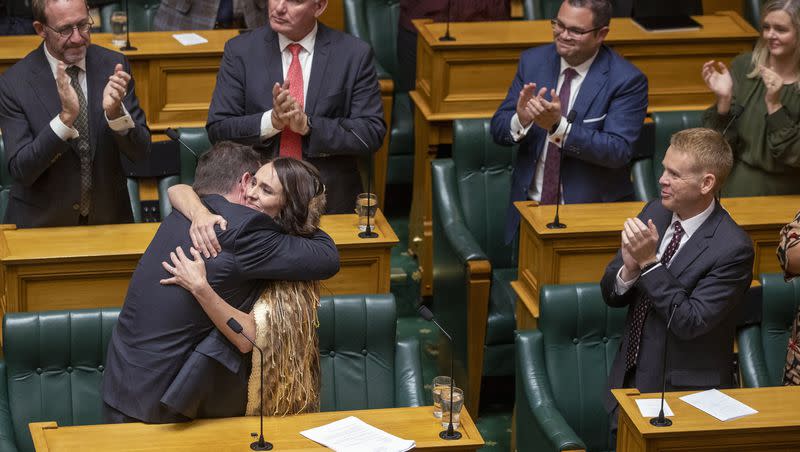Jacinda Ardern didn’t let politics change her. Instead, she changed politics

- Oops!Something went wrong.Please try again later.
- Oops!Something went wrong.Please try again later.
When New Zealand’s prime minister, Jacinda Ardern, stepped to the podium to deliver her farewell address, she did so as the rare leader who voluntarily stepped away from the pinnacle of power. Her time in office has been marked by her candor, her kindness and her inclusivity. She showed the world that politics doesn’t have to change you — that you can change politics.
When she entered Parliament in 2008, she was the youngest sitting member at age 28. She entered with the same goals that drew her to the Labour Party at age 17 and that defined her time as prime minister: climate change, child poverty and inequality. As prime minister, she appointed the first Indigenous woman as foreign minister, lifted tens of thousands of New Zealand’s children out of poverty and implemented an ambitious goal to reduce emissions by 50% by 2030, less than seven years away.
However, her time as prime minister has also been marked by the unexpected: a domestic terror attack at two mosques in Christchurch, a deadly eruption of the Whakaari volcano and a global pandemic. She and the rest of Parliament took immediate action and banned military-style weapons within a month of the attacks in Christchurch.
Related
New Zealand mosque shooting: Gunshots shattered a day of prayer, but gave rise to interfaith resolve
New Zealand Prime Minister Jacinda Ardern steps down. How will her administration be remembered?
What New Zealand’s Jacinda Ardern said in her farewell speech
New Zealand’s response to the pandemic was to close its borders tightly, locking the island nation down for more than a month. Polling in May 2020 found nearly 92% of New Zealand respondents felt it was the right call, and she became the most popular prime minister in a century.
The country locked down again in August 2021 because of a single case of COVID-19, arguing that “going hard and early has worked for us before.” Since the beginning of the pandemic, New Zealand has lost almost 2,700 people to COVID-19, but estimates of what “could have been” go as high as 80,000. According to data from John Hopkins University, the death rate per capita in New Zealand is less than one-sixth the rate in the United States.
In her farewell speech, she did not pontificate on how awesome she was. In fact, she noted that there was still much to do, and that very few things that she wanted to work on in politics have an end point. “Politics has never been a tick list for me,” she said. “It’s always been about progress. Sometimes you can measure it, and sometimes you can’t.”
“We won’t ever know the long term benefits of banning conversion therapy, especially for our young people. Or what it means to our Pacific communities that we finally apologised for the dawn raids. There will be no list of the lives saved because of the banning of military style semiautomatic weapons. We won’t know how we left woman feeling about the ability to make their own choices when this parliament decriminalised abortion, or when we improved pay equity, put period products into schools, or reached 50% representation of women in parliament.”
When is the last time you’ve heard a politician, let alone a head of state, talk about work left undone as they step away? Usually that line is used to run for reelection.
What I’ve seen as an outside observer since she took office in 2017 is her unfailing kindness and empathy. As women in politics often are, she was criticized for being too sensitive, for being too quick to hug. She even went to an adviser to ask how to “harden up,” as she thought she needed to change who she was to survive.
Instead, she changed politics around her. She normalized being a mother and a politician (only the second head of state to give birth while in office, by the way). She normalized being a “crier and a hugger.” Even when she was mocked for hugging, she decided that she would “rather be criticised for being a hugger than being heartless,” she said. “I leave this place as sensitive as I ever was,” she said. She normalized being true to oneself and she showed how to leave gracefully and authentically.
She ended her farewell speech by inviting others to step up and into leadership roles. You can be a worrier and be a leader. You can be a crier and a hugger and be a leader. You can be kind and strong, empathetic and decisive and be a leader. You can be a mom and a leader, you can be “anxious, sensitive, kind and wear your heart on your sleeve ... you can be all of these things, and not only can you be here — you can lead. Just like me.”
Consider yourself asked to step up and lead. You can change the world. Just like her.
Holly Richardson is the editor of Utah Policy.

